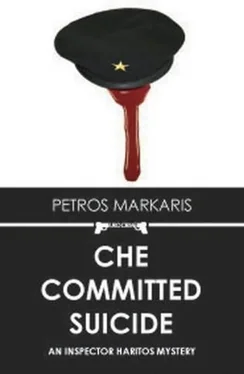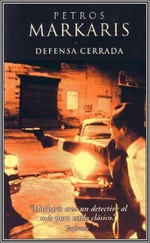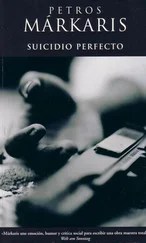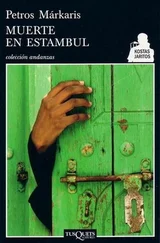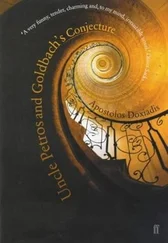She tossed the half-wrapped dolma into the pan and went out of the kitchen. In two minutes she was back with the keys to the Mirafiori.
‘There!’ she said, throwing them onto the table, ‘you’d put them in the wardrobe next to your underwear and you’d forgotten!’
I cursed myself for not following her into the bedroom. I’d have caught her red-handed taking the keys out of her hiding place, whereas now she was throwing the blame on me and I had no incriminating evidence to refute her.
Without saying anything, I picked up the keys and walked out of the kitchen. Koula had turned off the computer and was waiting for me.
‘Let’s be off,’ I said to her, explaining that we were going to pay a visit to Favieros’s offices.
She stood for a moment in the doorway to the sitting room, then, instead of coming with me, she made a beeline for the kitchen.
‘Are you making dolmades?’ she asked Adriani with admiration in her voice. ‘Will you show me how to wrap them because whenever I do it they always come undone!’
There was a short pause and then Adriani said: ‘All right, I’ll show you, it’s not so difficult, you know!’ This last phrase sounded more like: ‘Why, are you so incompetent!’ But Koula went on undeterred.
‘You know, since my mother died, I’m the one who has to do all the cooking for my father. He loves dolmades, but whenever I make them, the poor man ends up eating the filling and the vine leaves separately.’
Adriani had lifted her head and was staring at her. Though her expression hadn’t changed, I realised, because I knew her well, that she had been impressed by the fact that Koula took care of her father.
‘Come here and watch me one day and I’ll show you,’ she said with a smile. The smile was still acerbic, but with a bit more lip.
Once outside I handed over the keys to the Mirafiori, which was parked at the corner of Aroni and Protesilaou Streets.
‘You drive,’ I said to her, ‘Adriani has exercised her veto on me.’
She chuckled. ‘Don’t worry, I passed my driving test with distinction.’
The car doors opened okay, but there the Mirafiori’s willingness came to an end. When Koula tried to start it up, it rumbled slightly and then stopped. At the fourth attempt, it lurched so violently that it almost catapulted us through the windscreen, before starting up with a wheezing sound.
The offices of Domitis Construction were in Timoleontos Street, close to the First Cemetary. I was glad it wasn’t far from my home so we wouldn’t have to overwork the Mirafiori after it had been stationary for two months. Turning into Vassileos Konstantinou Avenue, we hit a wall of traffic. Because of the Olympics, Athens had turned into a ploughed-up field and the drivers who hadn’t got themselves a tractor in time were now seeking safety on roads that had still not been dug up, with the result that the traffic had come to a standstill. A policeman at the junction between Vassileos Konstantinou Avenue and Rizari Street gestured at us abusively, not because we would move any quicker like that, but because his eyes had tired of seeing us. Then just as I was breathing a sigh of relief at the fact that the Mirafiori was managing bravely with all the stopping and starting, it gave up the ghost at the red light in Diakou Street. The engine gave out and, when the lights turned to green, it wouldn’t start up no matter what. Those behind honked their horns like people possessed, Koula was getting more and more exasperated because with each new attempt, she drowned the engine even more, while those cars that managed to slip out and pass us stuck their fingers up at us just to boost our morale.
‘Let me get it started,’ I said
While I was trying various tricks to get the thing moving, a convertible pulled up beside us. Sitting behind the wheel was a youngster with a crocodile on his T-shirt and spiked hair. In the past we used to starch our collars, now it seems we starch our hair.
‘Eh, you old fogey. What are you doing with the chick in that pile of scrap?’ he shouted angrily. ‘Get yourself a convertible like us, birdbrain. Look at the face on the old fogey!’ And stepping on the accelerator, he smothered us in exhaust fumes to get his own back. In my consternation, I had forgotten that the Mirafiori was stuck at the lights. I cast a sideways glance at Koula, who was trying to remain composed, but failed, and broke into loud peals of laughter.
‘At times like these, the bad copper comes out in me and I want to arrest whoever I see in front of me,’ I told her.
‘Come on, show a little understanding.’
‘Understanding?’
‘Don’t you get it? His girl has dumped him and he’s taking it out on you.’
That’s one explanation that hadn’t occurred to me at all and it filled me with such delight that I turned the key as though caressing it and the Mirafiori started up at the first attempt.
I was expecting to find myself before a modern office block of dark concrete and one-way windows, but what I found was a three-storey neoclassical building, recently renovated. The modern office block was behind it. At first, I thought they were two separate buildings, but when I looked from the side, I discovered that there was a small bridge, rather like a glass tube, connecting the two buildings. The same social disguise employed by Favieros could be seen even in his business. At first sight, he didn’t want to live in the same neighbourhood with the moneybags in Ekali; his house in Porto Rafti, however, was the house of a moneybag. At first sight, he preferred neoclassical buildings to the modern office blocks; behind the neoclassical building, however, was the modern block. He wore Armani suits, but crumpled and without a tie. Of course, to blame for this might have been the prudishness that leftists feel about their wealth and so they cover it up with a fig leaf, not to stop other people seeing it, but so as not to see it themselves. But perhaps equally to blame is the outlaw syndrome that leftists suffer from and that makes them persist with the disguise, albeit pointlessly, out of an acquired momentum.
Dominating the spacious hallway, facing the entrance, was a portrait of Favieros, draped in black out of mourning. Beneath it was a pile of floral bouquets. The receptionist was a pleasant-looking fifty-year-old woman, simply dressed and without make-up.
‘Good morning. How might I help you?’ she asked us politely.
‘Inspector Haritos. This is Officer Koula…’ I suddenly realised that I didn’t know Koula’s surname and I got stuck. Fortunately, she understood and cut in.
‘… Kalafati. Koula Kalafati.’
‘We’d like to see whoever’s in charge,’ I added politely.
‘Is there anything wrong?’ she asked worriedly. She had just been through one tragic event and now, fatalistically, she was waiting for the next one.
‘Nothing at all. It’s purely routine. I’m sure you can imagine that when such a well-known figure commits suicide, and publicly as well, the police are obliged to carry out a routine investigation so as not to be accused of not looking into it.’
Privately, I was hoping that she would go for my little spiel and not suddenly decide to phone the police to verify it.
‘Take a seat for just a moment,’ she said, picking up the phone.
We sat down in the two metal chairs facing her desk. The hallway had been meticulously renovated. Wooden panelling halfway up the wall, with the rest of the wall painted a light pink colour. The carvings on the ceiling had been restored to their original form and they made you nostalgic for the old light fittings with candles or bulbs. The furnishings were the usual design as in all offices: metal chairs, desks of metal and wood, computers. But it didn’t jar; perhaps because it was all so neutral and was absorbed by the neoclassical restoration, rendering it inconspicuous.
Читать дальше
